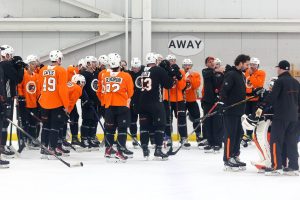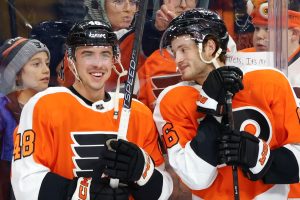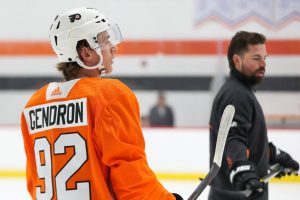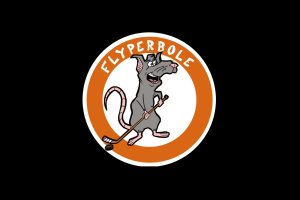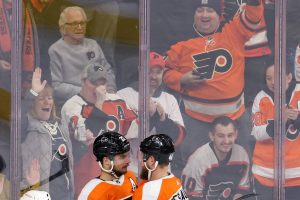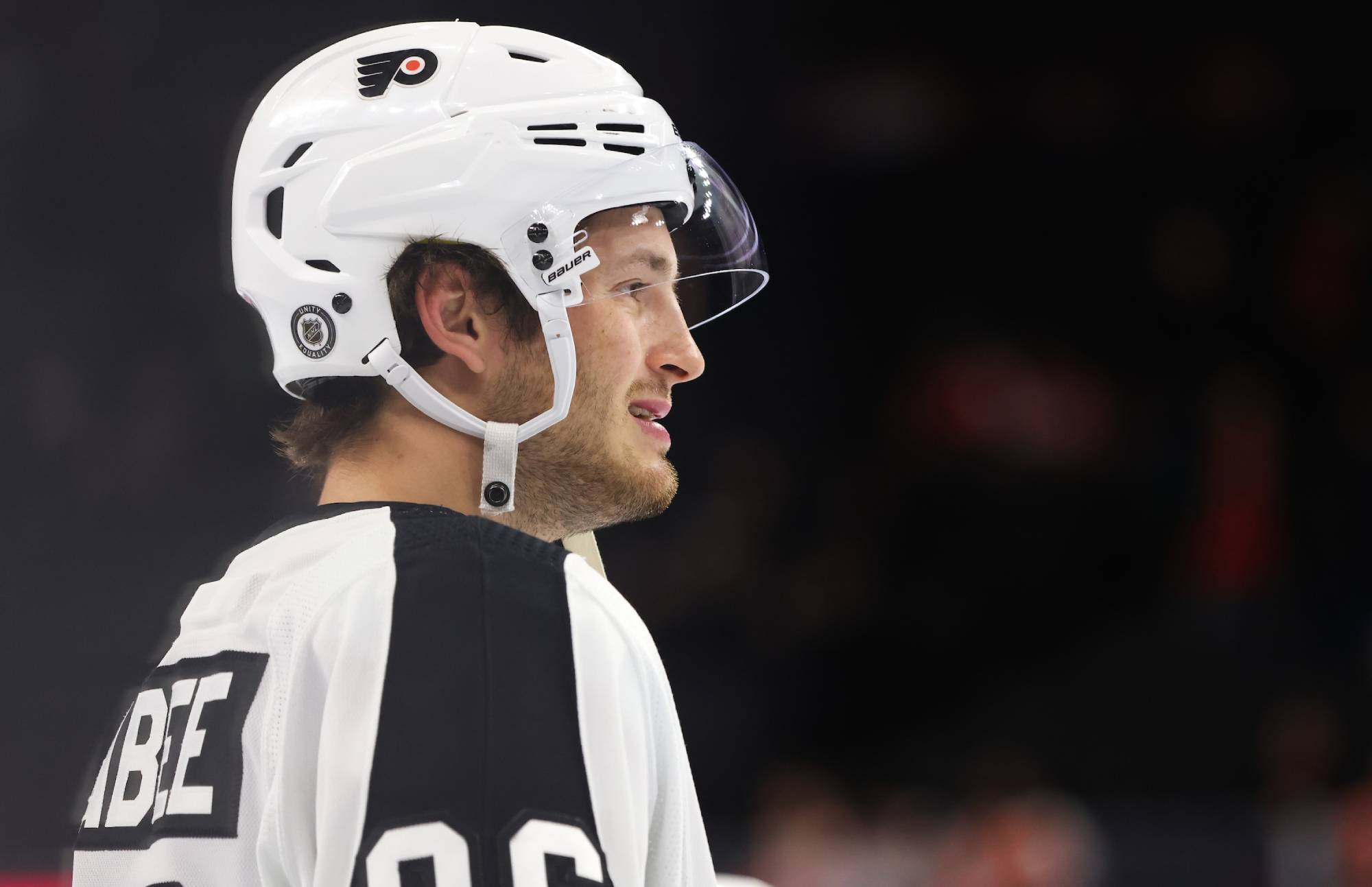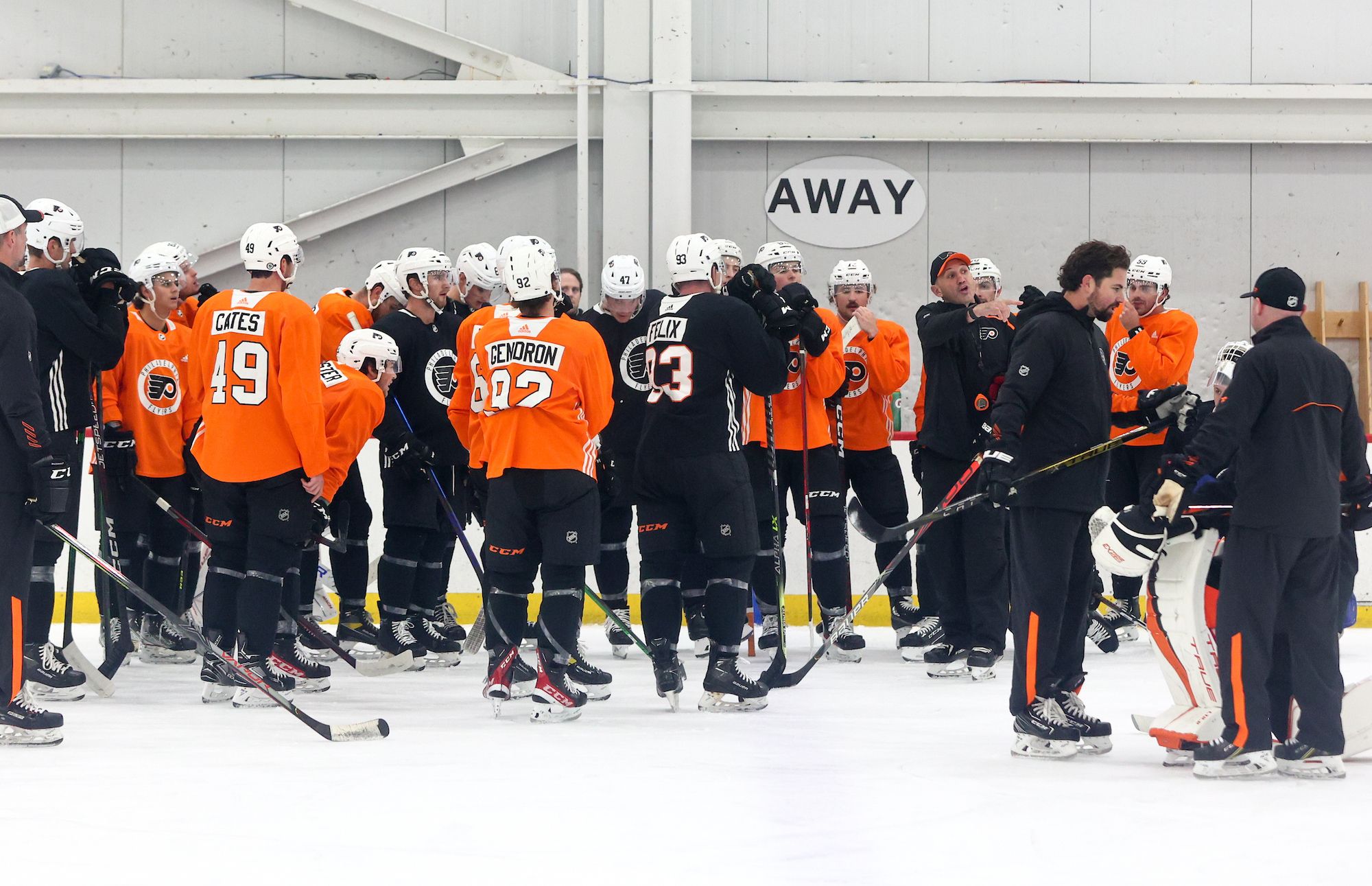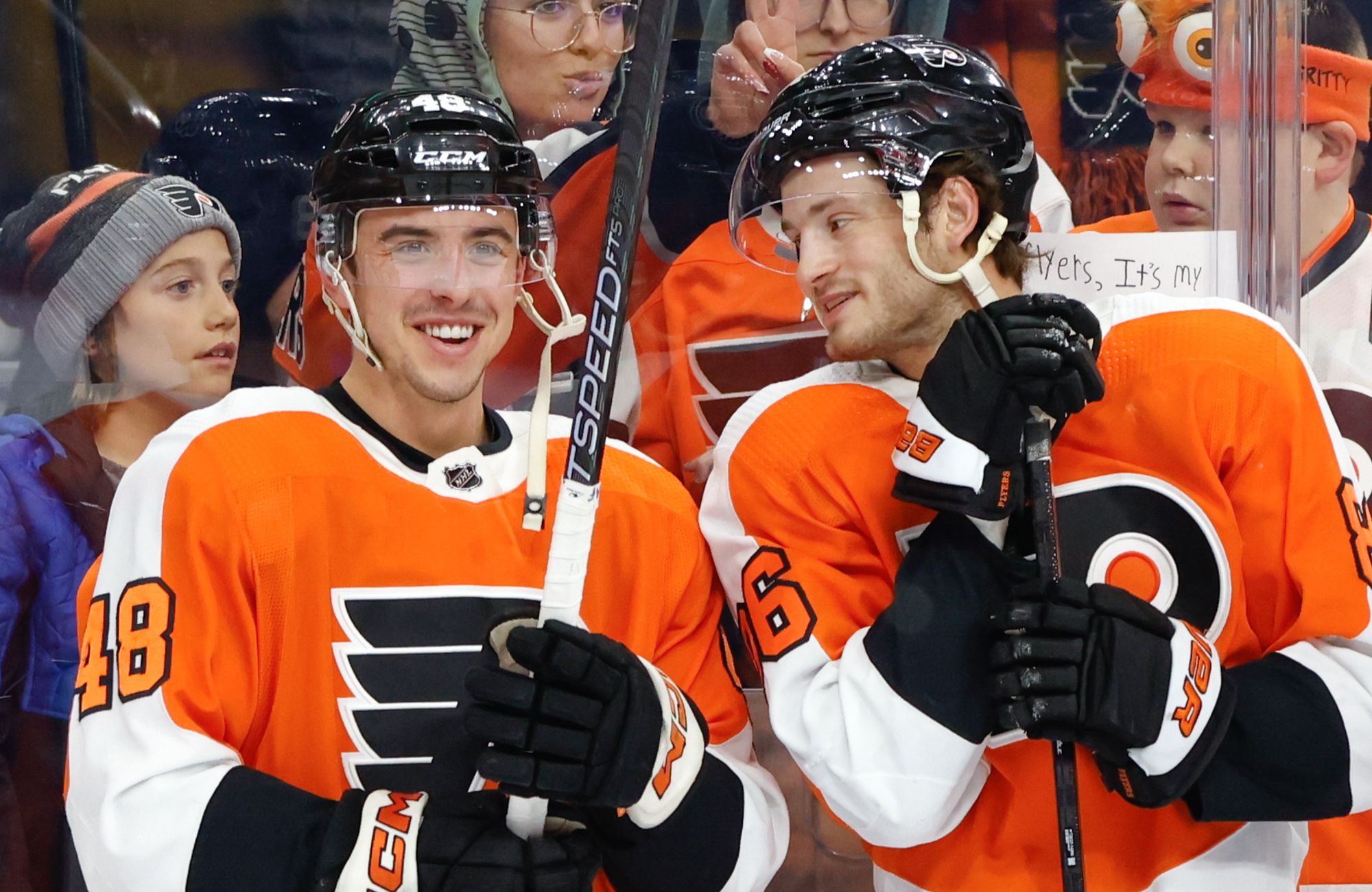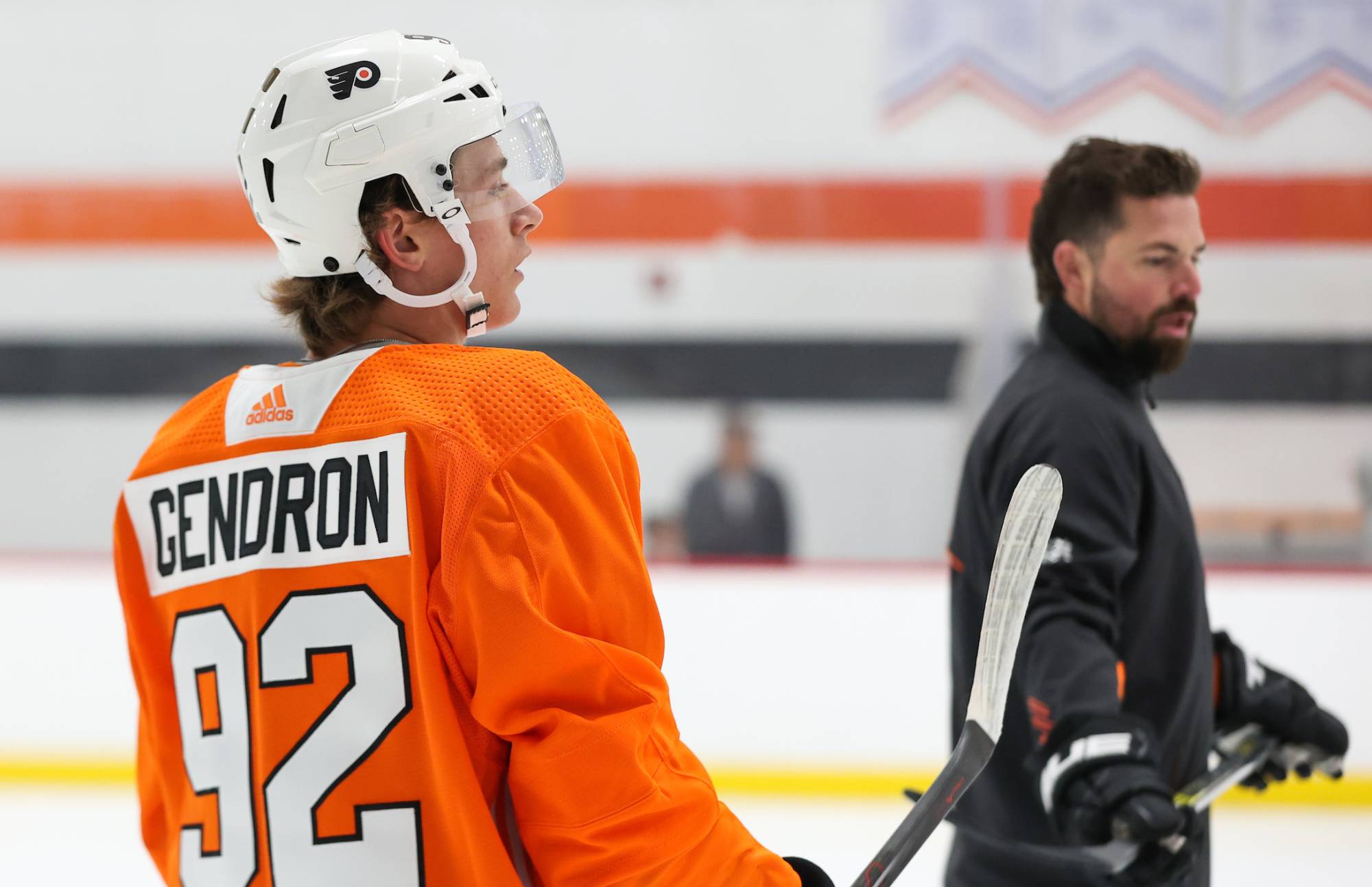Our final Morning Observations of the season will focus on the Flyers’ exit interviews, which took place on Tuesday throughout the day.
#1: Voracek confirmed that foot never fully healed
As many suspected after watching Jakub Voracek struggle during the final month of the season into the playoffs, the foot injury that he suffered in February apparently was affecting his play. Voracek was careful to note that the onus was on him to adjust to the injury and that he failed to so, but he explained that it sapped a key strength of his game which had something of a domino effect on a number of other skills.
“The foot, it’s not healed 100 percent. It’s gonna take a while. But it didn’t change my game. I wasn’t very confident on that foot, but it’s not an excuse for me to have one point all series. Just gotta be better — that’s the easiest way to say it. You learn the hard way sometimes, and I learned the hard way.
My game is built around the first two steps, cutting and crossing. You have two or three quick steps, you create that separation from the other players, and then you have more time to make the play. I wouldn’t say [the foot] was “hurting” and that’s why I wasn’t myself, but if you don’t create that separation that you are used to, you start missing passes. You start missing things.”
Voracek plans to rest up this offseason, and expects to be fully healthy by the World Cup of Hockey in September.
#2: Umberger expects buyout
After two underwhelming seasons in his second stint with the Flyers, R.J. Umberger’s status with the organization looms large as one of the biggest questions facing general manager Ron Hextall in the offseason. Umberger has one year remaining on his contract, but the 34-year old suspects that he may have skated his last game for Philadelphia.
“I expect one [a buyout]. I mean, who wouldn’t, after a season like the one I had. But the business side, you can’t control that.”
A buyout would save the Flyers a total of $3 million in cap space for the 2016-17 season, but they would face a new $1.5 million charge for the 2017-18 season. Most importantly, a player who no longer seems to be in the organization’s plans would be off the roster. Umberger, to his credit, seemed more disappointed by the way his second tenure in Philadelphia turned out, rather than angry or vindictive.
“That’s Hexy’s decision to make. Wherever I’ll be, I’m going to come in the best shape like I always do, ready to have a better year. I know I can play better. I know I still have stuff in the tank.”
#3: Giroux holds that he’s not injured
Unlike Voracek, who freely admitted that his foot injury did hamper him, Claude Giroux was adamant that he was not suffering from a secret injury in the series. It was brought up that he uncharacteristically struggled in faceoff percentage in the series, which Giroux waved off, stating that he was fine.
Also, when asked if he was banged up due to the heavy checking of the series, Giroux would only say that he was as nicked up as the rest of his teammates.
“Everybody was [banged up]. It was a physical series. Of all the series I’ve played in, I think that was one of the most physical ones. It was a lot of big boys throwing the body around.”
Jakub Voracek did hint in his comments that Giroux maybe was suffering from fatigue late in the year, an alternate theory for the captain’s one-point performance in the series against Washington.
“Especially down the stretch, if you don’t have to chase the points, that means you can rest some players. You don’t have to play Giroux three games before the playoffs 25 minutes a night because we need to get in [the playoffs] or we need those points. If we would be in second place in the division, maybe you can give [Giroux] the last two games of the season 16 minutes to get some rest, and it might make a difference in that first round by being more rested.”
#4: Couturier might have been back for Game 7
This news makes the Game 6 loss to the Capitals even more difficult to swallow. Sean Couturier, the team’s shutdown center who went down with a shoulder injury in the first game of the Washington series, was going to do all he could to play in the deciding seventh game if it proved to be necessary.
“I was gonna try for sure. But I don’t know. You gotta think too, if I play, let’s say we win [and I get hurt again], then I’m out for the rest of the playoffs. Kind of a tough situation to calculate. But I was close to returning. I was skating, it was two days I was skating by myself.
I actually tried earlier, after Game 3, tried skating. I couldn’t shoot at all, so it wasn’t even worth trying. Then, after Game 5, I started skating and I could shoot a little bit. It wasn’t hard, but it was getting better. I was close to returning but it was tough to say if I would have been able to play or not.”
Couturier also gave full details on the nature of the injury. It was, as had been rumored, a shoulder issue.
“AC joint separation, I think. Grade 2-3. No surgery needed, last time I checked. I think it should be good in a few weeks.
#5: Lots of compliments for Hakstol’s system
As the players did throughout the season, they universally praised the impact of Dave Hakstol’s system upon their late playoff push. Both young players and veterans alike sang the praises of Hakstol’s preferred tactics.
Scott Laughton noted that the Flyers are adept at forcing teams to play dump-and-chase hockey rather than enter the offensive zone with possession. This is backed up my my manual neutral zone tracking, which found that Philadelphia held opponents to a 46.48% Controlled Entry rate at 5-on-5 in the regular season.
“[Hakstol] is one of the best coaches I’ve played for, for sure. He’s got really good systems, and that’s why we got to where we were. We forced teams to dump a lot of pucks in, and we didn’t give up a lot in the latter half of the year.”
Nick Cousins specifically noted his fit within Hakstol’s preferred aggressive forechecking style.
“I think it’s no secret that we’re a forecheck team. When we get in on pucks and get on the body, that’s when we’re most effective. We play a pretty aggressive style, and that sort of suits my game. That’s the way I like to play.
Sam Gagner, on the other hand, discussed Philadelphia’s neutral zone tactics and the time it took for him to get used to a unique style.
“We do some things that are different in the neutral zone than alot of other teams, and I felt like I adjusted well in the second half and it helped my game. That was an area where I felt there was a lot of room for growth for me, defensively and offensively, carrying the puck through the neutral zone and defensively, being a better checker through that area. I thought I grew in that area and I think it’s going to help me going forward.”
#6: Read’s great advanced stats versus poor point production
Matt Read had an odd season. His advanced even strength puck possession metrics were the best of his career, yet his 26-point season was a career-low, resulting in the 29-year old forward receiving a great deal of criticism from fans and media alike. I asked Read about the disparity between his high amount of offensive zone time and mediocre offensive production, and he explained that this was an issue that he and the coach had actually addressed in his exit interview.
“I actually just talked to Hak about this. As a line, we’ve been in the offensive zone a lot, we’re getting pucks there, but there’s really no one there, there’s no one being the screen guy or getting rebounds. We’re all, I guess, perimeter players, cycling in the corner, doing the little things outside but not getting into the tough areas.
We talked about getting in front of the net more often, or getting in that tough area where you take a crosscheck to get a rebound or do the little things. I think that’s where 95 percent of the goals are scored off of, rebounds or things right around the net.
Not many guys can shoot from the top of the circles and score 50 every year. You’ve got to learn how to score goals, it gets harder and harder every year obviously with video and how everyone’s concentrating on every little aspect of defensive hockey. You’ve just got to find a way to score and produce as much as you can to help your team.”
#7: Gostisbehere’s aggressiveness encouraged by coaches
Shayne Gostisbehere hit the NHL already a dynamic offensive weapon, and it was that skillset that earned him national attention and a comfortable spot in the Calder Trophy race. But what will decide whether he takes the next step into being a possession-driving defenseman in future seasons depends upon his ability to clean up the other side of his game, without the puck on his stick.
To the Flyers’ credit, it appears that they are not trying to turn him into a passive, play-it-safe defenseman in the NHL. Instead, they’re working to take full advantage of his plus skating and aggressive nature to get the most out of him on the defensive side.
“Our D coach, [Gord Murphy], he says, “Use your abilities out there,” and “You’re not going to crush anyone out there, but you’re fast, you’ve got speed. Close in on guys quicker.” I think that the big thing for me is using my abilities, not only on the offensive side, but on the defensive side. I can use my feet to close in on guys quicker.
Considering the fact that Gostisbehere was the best Flyers’ defenseman at forcing opponents to resort to dump-and-chase hockey rather than carrying the puck into the offensive zone, it appears that the 23-year old already has a knack for taking away time and space in the neutral zone. It’s nice to hear that the coaching staff seems to want him to do the same in his own end.
#8: Ryan White really wants to come back
As a key member of the “Untouchables” line, Ryan White received the most ice time of his career in 2015-16 and posted his best scoring season as well, finishing with 11 goals. However, White’s 5-on-5 on-ice shot attempt differential (Corsi For) was less impressive, as he posted a -5.18% Corsi Relative to his teammates. Still, it seems likely that the Flyers will attempt to re-sign White considering his expanded role this past season, and White is more than open to the idea — he welcomes it.
“I’d like to be back. It’s a good fit to be here in Philly. My family loves it here, I love playing here. When you’re somewhere else and maybe things didn’t go as well, and then you finally get to a spot where you’re getting some opportunity and people around the team all have the same mindset as you do, I think you don’t really want to test too many waters, I guess.
Business is business, and hopefully we get something done. Free agency isn’t the best situation for every guy. They say it is, but I’ve been through it a couple of times, and the first time there weren’t any offers. Obviously I had a better season this year, so maybe there would be a little bit better of a market, but I would like to be back and be a Flyer.”
White also hinted that he would be willing to be flexible on his contract if it meant a guarantee to stay in Philadelphia.
“Are you searching for money or a new opportunity, or are you searching for a place where you’re wanted, a place where you’re getting minutes, and you’re getting a big part of the chance to help your team win? Knowing the system, knowing the coach, having the coach’s respect and having him liking you and playing you is a big thing. I think that’s a tough thing to find sometimes. It’s almost to the point where — what do you want to give up to give it away? It’s just — how much is money worth compared to being a Flyer?”
#9: Cousins to work on skating speed in offseason
A pleasant surprise from a production standpoint was the play of Nick Cousins, who was called up for the second time in early February and never returned the AHL. Cousins scored ten points (six goals, four assists) in 36 NHL games this season, and posted a solid +1.70% Corsi Relative to his teammates while mostly playing the role of a third line center.
But Cousins has no intention of resting on his laurels. He already has big plans to upgrade one specific area of his skillset.
“I think I need to improve on my skating a little bit. I’m not the biggest guy but I need to be a little bit faster. That’s where I’m trying to improve in, I think it’s no secret. I just talked to [Hextall] and [Hakstol] and I think they’re on the same page with me. It’s going to be a big summer — I’ll take some time off here now, and come into camp ready to go.”
Cousins was particularly impressive on the forecheck in his rookie season, but additional speed would go a long way in making him even more dangerous both with the puck and in his retrieval game. It will be interesting to see at camp next season if his summer work paid dividends.
#10: Laughton’s “OK” year, possible position switch
After Scott Laughton earned a spot on the Flyers out of training camp to start the 2015-16 season, he became an obvious candidate for a breakout season. Instead, Laughton’s performance was more mixed. He finished with 21 points in 71 games, and was a late-season scratch after essentially losing his role as third line center to fellow youngster Nick Cousins.
When asked about his season, Laughton stressed the positives while noting that he had hoped for better.
“I made a little step, I don’t think I took a step back. I thought my year was “OK,” that’s the best way to describe it. Definitely was tough sitting out those last couple games, watching the guys go to battle and stuff like that. I’m going to be ready to work at camp next year and going to be ready to fight for a spot again. It hasn’t come easy the last couple years and I don’t imagine it being any easier next year for me to try and make this team.”
Late in the year, Hakstol tried out Laughton at the wing position rather than his usual center role. Laughton had struggled with defensive zone turnovers early in the season, and the move to the wing was most likely a way to take some of that puck moving burden away from him and allow him to use his plus speed to stretch defenses and receive passes. The 21-year old seemed open to the new position.
“I know they liked me at the wing near the end of the year. I like it — less responsibility. But I only played maybe 20 games at wing and I’ve played my whole life at center. It’s definitely more responsibility [at center], and I think you’re in the game a little bit more when you’re taking faceoffs and stuff like that. I’m comfortable with anywhere they put me, I’ve said it the past couple years, so I’m going to work on my game and be ready wherever.

